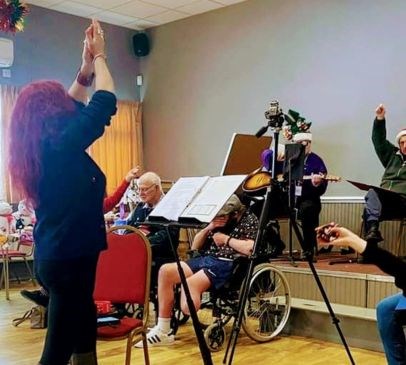Having learnt a lot from providing music sessions at an acquired brain injury (ABI) unit, Sophie saw first-hand how impactful the provision was for residents, encouraging them to leave their rooms and interact with others, supporting their emotional well-being and recovery.
"One group member told a support worker that attending the sessions each week had such a positive impact on her mental health that her feelings of not wanting to be here subsided.”
Taking this knowledge and experience, Sophie began delivering sessions at her local Headway group.
Sophie recalls:
“I first started working with Headway when the manager of Headway Bedford saw me deliver a music session at an ABI unit they were visiting. That was over five years ago, and I’m still providing weekly sessions, and now to more than one Headway group.”
This led Sophie to complete an MA degree specialising in the benefits of singing for brain injury survivors.
The benefits of singing are now well researched, and the impact on brain injury specifically is significant: lowering blood pressure and reducing anxiety. Releasing endorphins and serotonin, increasing lung capacity, improving posture and reducing inflammation in the body.
Sophie’s music sessions incorporate speech and language exercises and movement. Much of the session takes a rhythm-based approach, which is beneficial for controlling the movement of the hands and feet.
Songwriting has been a key feature of the sessions and provided a positive way of allowing group members to express intense emotions and thoughts in a creative way. A performance will be held in a local theatre this summer to showcase six songs written and performed by group members.
Beyond the benefits of the music sessions, the group have an exceptional bond and has created many strong friendships.
Sophie said: “There is a deep bond within the group, and I feel I'm in a very privileged position as a facilitator and group member. Friendship and group cohesion have become powerful. We have laughed and cried together.”
This combination of music and friendship has supported members in processing emotions and handling challenging situations, too. Sophie recalls:
“During lockdown, the sessions took place online, and although it was a different dynamic, it still had the same positive impact. Unfortunately, we lost two long-term members during this time. It was through music that we processed this upsetting experience while grieving. We celebrated the members’ lives through songs they loved to sing. The session content was planned around their lives.”
The positive impact on the mental health and emotional well-being of group members has been significant. Below is a testimonial from one of the members of the Headway Lincoln group.
“My husband suffered a ruptured brain aneurysm nearly 3 years ago. He had worked long hours all his life up until he retired just 2 weeks beforehand. He therefore never had many interests or hobbies, so it has been really difficult trying to find something he would enjoy for himself, and he had the confidence to try.
He loved the music therapy sessions from the very beginning. Sophie is so fun and approachable Mick was able to open up to her from the very first session. We all cried, laughed and sang our way through it. It was a very emotional experience and it allowed Mick to really express his feelings. I love to see him come away from the sessions feeling happy and more self-assured”.
Sophie went on to develop a toolkit of exercises for reducing anxiety, increasing lung capacity and benefiting the mental health of the group members, which allows staff with no musical experience to implement sessions in their own groups
Keep an eye out for coverage of the summer performance in our Headway News magazine.
Back









